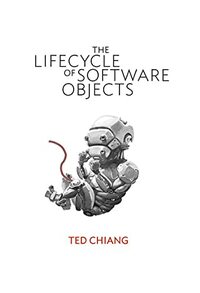Take a photo of a barcode or cover
This was so so good . Gonna go hug my Neopets.
Spoiler
except for the weird sex plot. Based on the rest of this writer's body of writing it felt weird that he would resort to sex work to create a moral conflict when there are so many more options ie "Seventy-two Letters"
emotional
reflective
sad
medium-paced
Plot or Character Driven:
A mix
Strong character development:
N/A
Loveable characters:
N/A
Diverse cast of characters:
Yes
Wonderful take on AI. You can read it free online here, http://subterraneanpress.com/magazine/fall_2010/fiction_the_lifecycle_of_software_objects_by_ted_chiang#top
This is an elegant and innovative tale simply and beautifully told unlike any I have ever read before. The software objects are interactive characters call digients created as products in a virtual world to be cared for and capable of learning. The humans are employees of the company that created them and caretakers. This is an experiment in product creation, consumerism, lifecycle, ethics, and attachment. I'm not surprised this won a Hugo because big themes are tucked neatly within the story. I think this book is a 'must read'. It has the benefit of being a quick read and a page turner just to see what happens next. I rated this at 4 stars instead of 5 stars only because I wanted more when the book ended. I so want to see what happens next.
Fun short read. Good story on how we might achieve AI.
4.5/5 There are two types of good speculative fiction in my opinion. One is the entertaining type, the type that keeps you on the edge of your seat. The second one is the type that makes you think. You rarely stumble upon one story or book or even author that is both. Those are the greats. But they are not alone.
Ted Chiang is not an entertaining author in my opinion but he has mastered the "really makes you think" style of sci-fi in a way few of his contemporaries do. He writes tersely but well and never uses two words to express what he can do with one where a lot of sF&f writers (perhaps myself included) use 5 words instead. His work is perfect for the short story and novella format. And perhaps best of all, despite writing tersely, despite dabbling in science and philosophy, he knows how to get ideas across wiuthout sounding like a technical manual.
This is perhaps one of his most challenging works, a meditation on identity and the nature of digital consciosness, language maturity etc. wriiten up as basically a pokemon story. It is close to flawless and i could see this turned into a very good movie. Read it.
Ted Chiang is not an entertaining author in my opinion but he has mastered the "really makes you think" style of sci-fi in a way few of his contemporaries do. He writes tersely but well and never uses two words to express what he can do with one where a lot of sF&f writers (perhaps myself included) use 5 words instead. His work is perfect for the short story and novella format. And perhaps best of all, despite writing tersely, despite dabbling in science and philosophy, he knows how to get ideas across wiuthout sounding like a technical manual.
This is perhaps one of his most challenging works, a meditation on identity and the nature of digital consciosness, language maturity etc. wriiten up as basically a pokemon story. It is close to flawless and i could see this turned into a very good movie. Read it.
dark
reflective
medium-paced
Plot or Character Driven:
Character
Strong character development:
Yes
Loveable characters:
No
Diverse cast of characters:
No
Flaws of characters a main focus:
Yes
I refrain from a star rating until I have thought about this more.
I didn't particularly enjoy the experience of reading this. I don't know what I am supposed to think or feel. The conclusion was unsatisfying. I asked a lot of interesting questions about humanity, intelligence, communication, and relationship. The answers I came up with seem to be largely the product of my own preconceptions and not shaped very much by the story, which probably means that either it was ineffectively written or I refused to accept its conclusions. I don't know which it was.
This reminded me, in an odd way, both of McKinley's Sunshine and Alexander's Unsong.
I didn't particularly enjoy the experience of reading this. I don't know what I am supposed to think or feel. The conclusion was unsatisfying. I asked a lot of interesting questions about humanity, intelligence, communication, and relationship. The answers I came up with seem to be largely the product of my own preconceptions and not shaped very much by the story, which probably means that either it was ineffectively written or I refused to accept its conclusions. I don't know which it was.
This reminded me, in an odd way, both of McKinley's Sunshine and Alexander's Unsong.
Ana takes a job working for a company that’s creating digients, digital creatures that are like pets but with a higher intelligence. While they were originally created just as companion pets within virtual spaces, but it becomes obvious over time that with enough interaction and training that they can be more independent. But with upgrades in the digital world and obsolescence from companies going out of business or software no longer being supported, this creates difficulties for the digients to grow and thrive. Over time, those with digients must decide what they really want for them, and how much independence they want to give them.
This was an interesting novella that explores artificial intelligence, and how it might arise out of something that wasn’t intentional. It looks at how A.I. might be different from what people expect A.I. to be, at how it can be affected by upgrades in computer systems or by systems becoming obsolete, and at what an A.I.’s relationship with people might actually be like. It also looks at how much of the intelligence will be programmed and how much will come from direct interactions and experiences.
This novella was also included in “Exhalation.”
This was an interesting novella that explores artificial intelligence, and how it might arise out of something that wasn’t intentional. It looks at how A.I. might be different from what people expect A.I. to be, at how it can be affected by upgrades in computer systems or by systems becoming obsolete, and at what an A.I.’s relationship with people might actually be like. It also looks at how much of the intelligence will be programmed and how much will come from direct interactions and experiences.
This novella was also included in “Exhalation.”
challenging
emotional
reflective
slow-paced
Plot or Character Driven:
Character
Strong character development:
Yes
Loveable characters:
Yes
Diverse cast of characters:
N/A
Flaws of characters a main focus:
Yes



